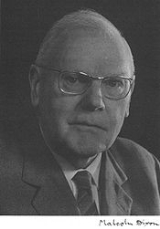
Malcolm Dixon
Encyclopedia
Malcolm Dixon was a British biochemist.
He was born in Cambridge, UK to Allick Page and Caroline Dewe (née Mathews) Dixon.
He received his PhD in 1925, under Frederick Gowland Hopkins
at the University of Cambridge
.
He studied physical biochemistry
, especially the purification of enzymes and the kinetics
of enzyme-catalyzed reactions. He studied the oxidation of glutathione
and other thiols by molecular oxygen and measured the redox
potential of the thiol-disulfide system, also establishing that the oxidation of glutathione was catalyzed by trace metals. He investigated xanthine oxidase, and thereby established many aspects of the chemistry of dehydrogenases. He showed that the hydrogen peroxide formed in the reaction of xanthine oxidase with molecular oxygen inactivated the enzyme and that the inhibition could be relieved by the addition of catalase, thus helping to establish a biochemical role for the latter enzyme. Dixon published a series of papers on D-amino acid oxidase
, detailing the kinetics and thermodynamics of association of the coenzyme with the apoprotein
, the substrate and inhibitor specificity, and the effect of pH on the kinetic constants.
He was an expert on the theory and use of manometers. In 1931, he collaborated with Keilin
and Hill to determine the first absorption spectrum of a cytochrome, cytochrome c
. Dixon studied the chemistry of lachrymators and mustard gas and proposed a phosphokinase theory to explain their mode of action.
He was elected a Fellow of the Royal Society in 1942. He died in Cambridge in 1985.
He was born in Cambridge, UK to Allick Page and Caroline Dewe (née Mathews) Dixon.
He received his PhD in 1925, under Frederick Gowland Hopkins
Frederick Hopkins
Sir Frederick Gowland Hopkins OM FRS was an English biochemist who was awarded the Nobel Prize in Physiology or Medicine in 1929, with Christiaan Eijkman, for the discovery of vitamins. He also discovered the amino acid tryptophan, in 1901...
at the University of Cambridge
University of Cambridge
The University of Cambridge is a public research university located in Cambridge, United Kingdom. It is the second-oldest university in both the United Kingdom and the English-speaking world , and the seventh-oldest globally...
.
He studied physical biochemistry
Biochemistry
Biochemistry, sometimes called biological chemistry, is the study of chemical processes in living organisms, including, but not limited to, living matter. Biochemistry governs all living organisms and living processes...
, especially the purification of enzymes and the kinetics
Enzyme kinetics
Enzyme kinetics is the study of the chemical reactions that are catalysed by enzymes. In enzyme kinetics, the reaction rate is measured and the effects of varying the conditions of the reaction investigated...
of enzyme-catalyzed reactions. He studied the oxidation of glutathione
Glutathione
Glutathione is a tripeptide that contains an unusual peptide linkage between the amine group of cysteine and the carboxyl group of the glutamate side-chain...
and other thiols by molecular oxygen and measured the redox
Redox
Redox reactions describe all chemical reactions in which atoms have their oxidation state changed....
potential of the thiol-disulfide system, also establishing that the oxidation of glutathione was catalyzed by trace metals. He investigated xanthine oxidase, and thereby established many aspects of the chemistry of dehydrogenases. He showed that the hydrogen peroxide formed in the reaction of xanthine oxidase with molecular oxygen inactivated the enzyme and that the inhibition could be relieved by the addition of catalase, thus helping to establish a biochemical role for the latter enzyme. Dixon published a series of papers on D-amino acid oxidase
Oxidase
An oxidase is any enzyme that catalyzes an oxidation-reduction reaction involving molecular oxygen as the electron acceptor. In these reactions, oxygen is reduced to water or hydrogen peroxide ....
, detailing the kinetics and thermodynamics of association of the coenzyme with the apoprotein
Apoprotein
Apoprotein can refer to:*Apoenzyme, the protein part of an enzyme without its characteristic prosthetic group.*Apolipoprotein, a lipid-binding protein that is a constituent of the plasma lipoprotein....
, the substrate and inhibitor specificity, and the effect of pH on the kinetic constants.
He was an expert on the theory and use of manometers. In 1931, he collaborated with Keilin
David Keilin
David Keilin FRS was an entomologist, among other things.His family returned to Warsaw early in his youth. He did not attend school until age ten due to ill health and asthma. Only seven years later, in 1904, he enrolled in the University of Liège...
and Hill to determine the first absorption spectrum of a cytochrome, cytochrome c
Cytochrome c
The Cytochrome complex, or cyt c is a small heme protein found loosely associated with the inner membrane of the mitochondrion. It belongs to the cytochrome c family of proteins. Cytochrome c is a highly soluble protein, unlike other cytochromes, with a solubility of about 100 g/L and is an...
. Dixon studied the chemistry of lachrymators and mustard gas and proposed a phosphokinase theory to explain their mode of action.
He was elected a Fellow of the Royal Society in 1942. He died in Cambridge in 1985.

